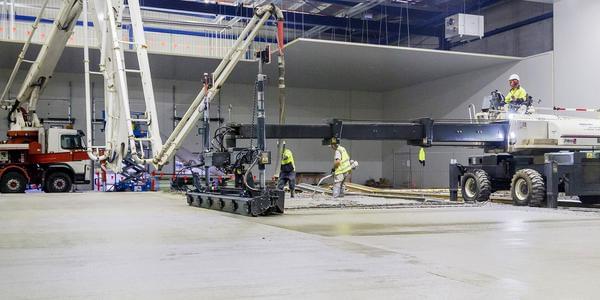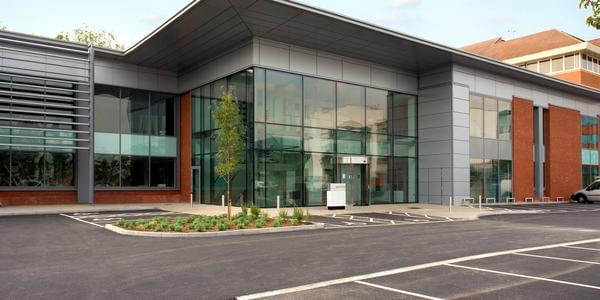Industrial & Warehouse Floor Repair- An Overview
The below article helps you to understand range of issues which can arise with the concrete flooring surfaces in warehouses & industrial factory buildings and the range of repair& refurbishment solutions which are available from industrial floor repair contractors.
The topics covered in this article include:
- Using concrete as a factory or warehouse flooring surface
- Concrete floor slab cracks– causes and concrete floor repair methods
- Joints in industrial concrete floors
- Floor joint damage & repair methods
- Other defects in industrial concrete floor surfaces (and the need for repair)
Concrete as an industrial flooring surface
The concrete floor slab is arguably the most important element of any factory or warehouse building – it is the platform on which all operations within the building take place. The concrete floor surface must be maintained in good condition to ensure that the required operational efficiency levels of the building are achieved (otherwise repair will become necessary)
The concrete which forms the warehouse floor or factory floor is a composite material which is composed of various constituent materials: a binder, usually cement, aggregates, and water as follows:
- Cement + water = cement paste
- Cement paste + sand = mortar
- Mortar + aggregate = concrete
Each of these constituent materials can vary in its chemical makeup and performance characteristics, depending on where it was quarried and the manufacturing methods and conditions used to produce it. These material variations combined with the differences in concrete floor laying methods and the end usage flooring loads, traffic & environment can result in a variety of defects arising in any warehouse floor or industrial floor which require specialist repair - these are described below.
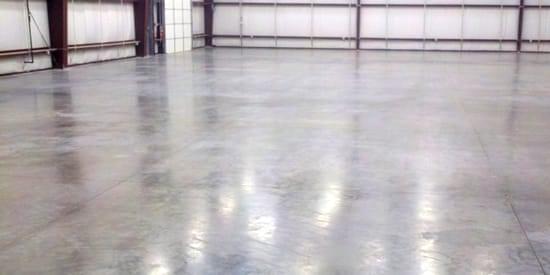
Concrete floor slab surface cracking – causes and repair options
Cracks in factory and warehouse floors are caused by a number of factors including temperature changes, changes in moisture levels, stress loads (such as heavy traffic or heavy objects), ground or building movement, the hydration process of the concrete slab when it is curing, or poorly placed contraction joints (see later). Before carrying out any concrete floor remediation work, it is important that the cause of the crack is understood and, if necessary, rectified. In general, cracks that have developed and are no longer moving can undergo repairs.
If a crack in an industrial floor or warehouse floor is moving, for example on a daily basis due to temperature changes, filling the crack will simply result in another crack forming adjacent to the original location. If the cracks are still likely to be subject to future movement, then they should normally be treated as joints (see below), cut square, brought through the floor finish and sealed with an appropriate floor joint sealant.
If the industrial floor or warehouse floor crack is no longer moving, then it can be repaired and sealed prior to applying the new resin flooring system. The industrial or warehouse concrete floor repair contractors you hire will choose the best procedure and materials for doing this depends on the width, depth and length of the crack. It is likely that the surface will need opening / cutting out to remove any loose materials and then it can be either 'surface sealed' with a fine epoxy mortar which is pressed into the cracks - an alternative renovation option is for the industrial concrete floor crack repairs can be achieved by structural bonding with low pressure epoxy resin injection products.
Most cracks in factory and warehouse floors (which require the services of concrete floor repair companies) occur in close proximity to the joints in the concrete surface – see next section for details.
Concrete floor joints - the approach of flooring contractors
Most industrial flooring repairs are related to the breakdown of joints in the concrete slab – floor joints represent unavoidable discontinuities in any factory or warehouse floor surface. The most common types of joints formed in commercial or industrial floors are contraction, expansion, and construction joints.
Contraction joints - While drying, hardened concrete will shrink about 1.6 mm in 3 metres of length - to regulate the location of crack formation, joints are placed at regular interval. These joints are usually sawed into the newly hardened concrete surface around 4-12 hours after concrete laying (by the same flooring contractors) – however the longer sawing is delayed the higher the potential for cracks to establish themselves (note: steel reinforced concrete requires far fewer contraction joints)
Expansion joints - these joints allow independent movement of concrete slabs due to vibration, settling, or temperature changes between adjoining concrete slabs thereby minimising cracking when such movements are restrained. Expansion joints are wider than contraction joints and should always be utilised where a concrete slab will join an existing structure of any type. (a wall, column, staircase, etc.).
Construction joints - this type of joint is not a true “movement” joint - these are formed when placement of the concrete is interrupted (e.g. - at the end of a working day for the industrial or warehouse concrete flooring installation contractor).
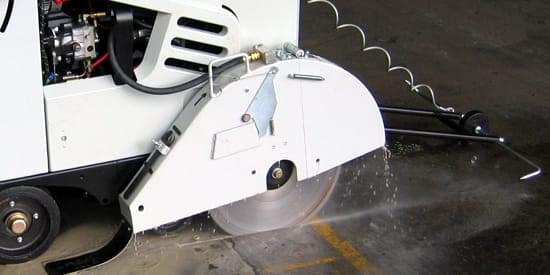
Concrete joint damage – causes and floor repair options
Factory and warehouse floors are subject to heavy floor load – as a heavy vehicle (e.g. a forklift truck transporting goods in a warehouse) approaches a joint, the slab will deflect slightly. As it deflects next to a joint, the top edge will crush against the concrete on the other side of the joint (eventually degrade the joints). To prevent this, the two sides of the joint can be “tied” together vertically so that one side can't deflect independently.
However floor joints are the most common requirement industrial and warehouse floor repairs. Their edges or ('arriss') are vulnerable to damage, and unless they are adequately protected, they will break and erode under impact from the passage of wheeled vehicles. Concrete floor joints in a poor condition can cause significant damage to the materials handling equipment (such as warehouse forklift trucks), resulting in increased maintenance costs and can often lead to health complaints from the vehicle operators.
When warehouse flooring repair companies or industrial concrete floor repair contractors need to fix floor joints - this will usually involve re-cutting, cleaning out and replacement with a suitable joint sealant which still allows for movement in the floor.
Other defects in industrial concrete floor surfaces requiring repair
There are other various defects on concrete floor surfaces which industrial floor repair contractors will experience in their day-to-day business with customers - these are as follows.
Concrete crazing - this a network pattern of fine cracks that do not penetrate deeply below the concrete surface – these are a result of differential contraction between the surface layer and the underlying concrete mainly brought about by drying shrinkage. Urgent repair may not be required.
Concrete slab curling - this is the distortion (rising up) of a slab’s corners and edges due to differences in moisture content or temperature between the top and bottom of a slab. The top dries out or cools and shrinks more than the wetter or warmer bottom - it can occur at any time up to about 2 years after slab construction. Depending on the warehouse or industrial building operations - urgent repair can be necessary. Concrete floor surface delamination – this defect is characterised by thin layers of floor surface mortar (up to 8mm) becoming detached from the main body of the concrete slab. The most common cause of de-lamination is bleed water becoming trapped underneath the surface layer forming a void under the surface layer which therefore is not bonded to the underlying slab.
Concrete surface honeycombing - this is the term used to describe concrete floor areas of the surface that are coarse and stony. It may be caused by insufficient fine material in the mix, perhaps due to incorrect aggregate grading or poor mixing. Depending on the type of traffic - repairs may not be necessary. Popouts - these are conical fragments that break out of the surface of the concrete floor leaving a hole that may vary in size generally from 5 mm to 50 mm but up to as much as 300 mm. The cause of a pop-out usually is a piece of porous rock having a high rate of absorption and relatively low specific gravity. As the offending aggregate absorbs moisture or freezing occurs under moist conditions, its swelling creates internal pressures sufficient to rupture the concrete flooring surface. The more extreme examples of this sort of damage will require urgent repair by specialist warehouse or industrial flooring contractors.
Dusting - this is the development of a fine, powdery material that easily rubs off the surface of the hardened warehouse or industrial concrete floor. It is the result of a thin, weak layer (called laitance), composed of water, cement, and fine particles. This is caused by denser cement/aggregate particles sinking from the surface immediately following laying of the concrete slab by the original warehouse or industrial flooring installation contractor.
Spalling - this type of fault appears as circular or oval depressions on surfaces or as elongated cavities along joints in the warehouse or industrial floor. Spalls may be 25 mm or more in depth and 150 mm or more in diameter, although smaller spalls also occur. Spalls are caused by pressure or expansion within the concrete, bond failure in two-course construction, impact loads, fire, or weathering. Improperly constructed joints and corroded reinforcing steel are two common causes of spalls - these will require urgent repair & floor renovation if there is a risk to - e.g. - warehouse forklifts (or the stock they carry) driving along the floor.
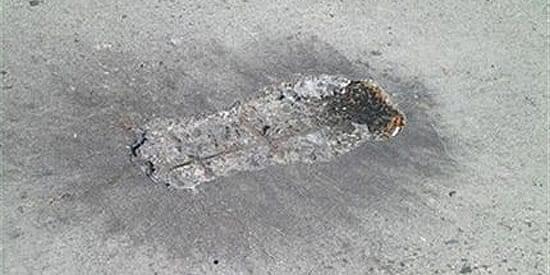
Looking to repair the concrete floor in your building?
Are you interested in carrying out industrial concrete floor repair or warehouse floor repairs? We offer warehouse and industrial floor repair contractor services to companies across the UK contact us today to get a FREE survey and quotation for your project! You can also use the following links to find out more about Industrial floor repairs, Warehouse floor repairs and Concrete floor repair contractors




